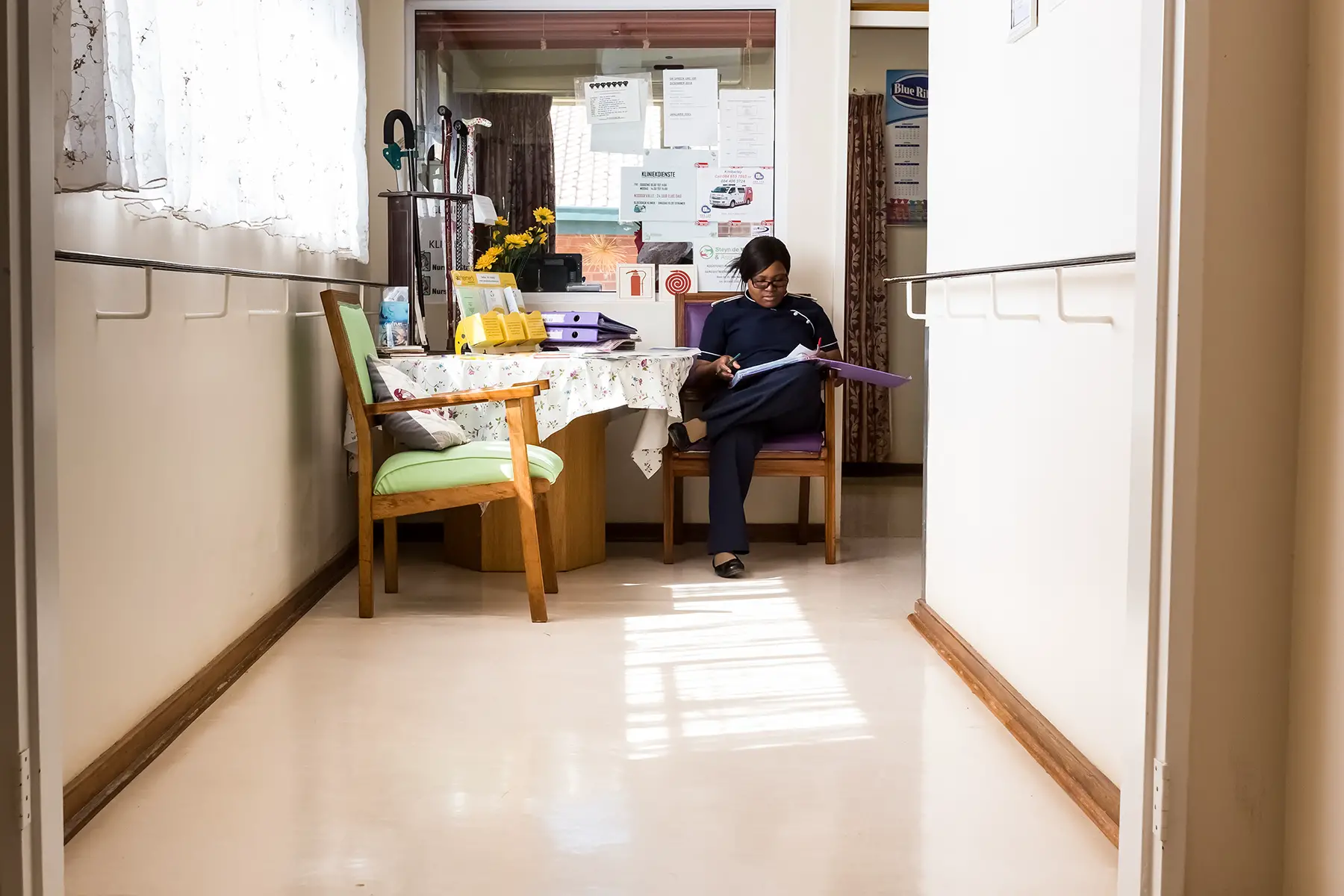Navigating medical aid in South Africa can feel like stepping into a world of glossy promises and fine print. From tailored plans to specialized care, private insurance holds undeniable appeal. But is it all it’s cracked up to be?
Whether you’re an expat sizing up your options or a local wondering if you’re getting your money’s worth, we outline what you need to know to make an informed choice.
Let’s dive in:
- Medical aid in South Africa’s healthcare system
- How does public healthcare work in South Africa?
- Overview of private health insurance in South Africa
- Who can apply for medical aid insurance in South Africa?
- How to apply for medical aid or insurance in South Africa
- How much does healthcare cost in South Africa?
- Useful resources
Cigna Global
Want access to the best private medical services in South Africa? Speak to the healthcare professionals at Cigna Global today and find a policy that’s right for you. Take advantage of their global network of doctors, specialists, therapists and more with coverage tailor-made for you and your family. Get peace of mind with Cigna Global.
Medical aid in South Africa’s healthcare system
South Africa’s healthcare system (Zulu: inkqubo yezempilo, Xhosa: uhlelo lwezempilo, Afrikaans: gesondheidsorg) has two tiers – public and private – that work in parallel to each other.
The public sector is funded through government spending and (nominal) copayments, whereas the private sector is financed by insurance plans offered by medical aid companies.
A mix of public and private coverage
The public health system covers essential care in South Africa, including doctor visits and hospital treatment. However, it is grossly underfunded and understaffed; clinics are often severely overcrowded, have notoriously long waiting times, and struggle to update their medical equipment.
That is where the private sector comes to the rescue.
Around 16% of South Africa’s population relies on medical aid and insurance to access better care more quickly. Aside from the shorter waiting times and (much) higher level of quality care, the private health sector has more modern facilities and covers more treatments than the public sector.

The Council for Medical Schemes (CMS) regulates the health insurance industry, making sure companies comply with government legislation. It reports to the National Department of Health (DOH).
The National Health Insurance Fund
The current system is set for a major overhaul in the coming years. In May 2024, President Cyril Ramaphosa approved the National Health Insurance (NHI) Law, aiming to create a state fund that provides universal quality healthcare and significantly reduces the role of private insurers.
For example, private insurance policies will no longer cover treatments that are also covered by the public system. That means you’d have to wait in line for state-funded care or pay out of pocket for private treatment.
Of course, the NHI Act faces strong opposition, especially from medical aid companies. Even the SA Medical Association (SAMA – a non-statutory doctor’s association) has called the legislation dangerously flawed, warning that it “risks collapsing our healthcare system rather than strengthening it.” In April 2025, SAMA announced it would challenge the law’s constitutionality in the High Court.
As a result, the roll-out of the National Health Insurance Fund is expected to be delayed for at least a few more years.
How does public healthcare work in South Africa?
South Africa’s public health system does not discriminate. The country believes that affordable healthcare is a fundamental right, and everyone can get public treatment, regardless of immigration status.
Normally, we would now explain that you would have to register for public insurance to access medical treatment. However, the country’s health services generally work on a walk-in basis. In other words, you can typically get medical help by just showing up.

What is covered by state healthcare in South Africa?
South Africa’s public health sector covers a range of essential services, such as doctor visits, basic dental care, vaccinations, medication and birth control, hospital and emergency care, HIV/AIDS treatment, and cancer prevention screenings.
The state-funded system is primarily designed to help vulnerable citizens (e.g., children, low-income adults, and patients with chronic conditions), who receive care free of charge. Other patients must pay a fee based on their income (called the Uniform Patient Fee Schedule – UPFS).
How to access public healthcare in South Africa
If you need immediate medical help, go to the nearest emergency department (Zulu: umnyango wezimo eziphuthumayo, Xhosa: isebe likaxakeka, Afrikaans: noodafdeling). You can also call 10177 for ambulance services or 112, the free national emergency number.
For non-emergency care, you register with your local health clinic or hospital. You typically need to provide:
- Valid ID (e.g., driver’s license, though foreign nationals must bring their passport and visa)
- Proof of income (e.g., salary slips or tax certificate)
- Proof of residence (e.g., utility bill)
- Proof of appointment (if you have been referred by a doctor)
- If possible, the address and contact details of your employer
The clinic may also ask for an affidavit from the South African Police Service (SAPS) to verify your address and income. Once the registration is processed, the health center can determine your UPFS fee.
Overview of private health insurance in South Africa
As we said earlier, South Africa’s public health sector is woefully underfunded and understaffed. For example, around 60% of doctors work in private healthcare. So, many more affluent South Africans and expats rely on private insurance or medical aid schemes to access better quality care and bypass the endless waiting times.

Medical aid vs medical insurance: what’s the difference?
Before we dive into the nitty-gritty, we have to explain a bit more about medical aid and health insurance.
Medical aid schemes are non-profit plans that cover the Prescribed Minimum Benefits (PMBs) that are determined by the government. Any medical bills are typically settled directly between the scheme and the service provider. Medical aid plans must accept all applicants, and premiums are the same for all members.
Medical insurance, on the other hand, is part of the for-profit industry. These plans usually only cover certain conditions or treatments (e.g., hospitalization). While they are generally more affordable than medical aid plans, premiums are based on health risk, and insurers can refuse applicants or coverage based on health assessments. Instead of paying medical bills, insurance companies usually provide cash payouts to policyholders.
To put this in a clearer overview, the difference between medical aid and medical insurance is as follows:
| Medical aid | Medical insurance | |
| Structure | Non-profit | For-profit |
| Coverage | Comprehensive | Limited and event-specific |
| PMB coverage | Mandatory | Not mandatory |
| Payment | High premiums, often income-based | Lower premiums, risk-based |
| Reimbursement | Bills are directly paid to service providers | Policyholders receive cash payouts |
| Typical use cases | Chronic illnesses, general health | Accidents, critical illnesses |

The advantages of private medical coverage
Both medical aid and medical insurance provide access to private healthcare treatments in South Africa. Other benefits include:
- Shorter waiting times
- Extra coverage (e.g., gap cover or hospital plans)
- Additional benefits (e.g., disability or funeral cover)
- Tailored services for special groups (e.g., pregnant people and pensioners)
- Wider range of service providers
- Access to better and more efficient medical care
- Higher levels of comfort and privacy in hospitals and health clinics
Who can apply for medical aid insurance in South Africa?
Like we said earlier, medical aid schemes are legally required to accept all applicants. Medical insurance, on the other hand, may refuse people based on their health assessments. Both may have general waiting periods (up to 3 months) and condition-specific waiting periods (up to 12 months for pre-existing conditions).
Medical aid or insurance for kids and students
South Africa’s public healthcare system provides free care to minor children under the age of 6, including dentistry and vaccinations. Older kids must pay the UPFS fees based on their family’s income.
Families who want to access private healthcare can take out medical aid or insurance and sign up their children as dependents, often at a reduced rate.
Similarly, health insurers often offer affordable plans for students (up to mid-20s). This can be especially good news for international students, who have to sign up for medical aid to cover the duration of their study program in South Africa.
Medical aid for retirees and pensioners
Older adults often have different care needs because of age-related illnesses and chronic conditions. Although they too have access to free or low-cost public healthcare, it can be beneficial for pensioners to sign up for a tailored medical aid or insurance plan. These cover broader treatment, like chronic illness management, hospital cover, specialist care, annual flu vaccinations, and healthy aging wellness programs.

Medical aid schemes for pensioners often have age-based discounts or reduced premiums for those with a fixed income (e.g., SASSA pensioners). It’s worth putting in some research, however: some companies charge late joiner penalties, which can increase your monthly premium.
Medical aid for gap cover
Even if you have signed up for a decent medical aid or insurance plan, you can still end up with unexpected bills – typically when a health service charges you more than what your insurer is willing to cover. That’s where gap cover comes in.
Gap cover is like insurance for your medical aid, basically a top-up or add-on. It usually covers things like hospital shortfalls, outpatient procedures, oncology treatments, and emergency care.
Premiums depend on your age, health history, and how much coverage you need.
International health insurance for expats
Depending on your situation as an expat living in South Africa, you might prefer an international health insurance plan that gives you access to private services and covers you around the world. International health insurance is especially appropriate in these cases:
- Expats who are still in the planning phase or have recently moved will need international health insurance to avoid a coverage gap between their former health insurance and South African plan
- International health insurance often provides broader options, including advanced treatments and specialists that are not readily available locally.
- Foreign students will need to prove that they have valid health insurance coverage before they can enter the country.
- Cross-border workers will want to have global coverage to make sure they don’t pay double. Expats who move around a lot will want to have global coverage, as these policies often cover you in multiple countries.
Some international health insurance plans also provide discounts or reduce premiums if you go a certain period without making any claims.
Allianz Care
Allianz Care is a world leader in providing international health insurance. Their various premiums provide professionally designed solutions for a variety of expat lifestyles. So, wherever your life takes you, make sure you have the right health protection for you and your family with Allianz Care.
How to apply for medical aid or insurance in South Africa
With many medical aid and insurance options available in South Africa, it’s wise to look around and compare plans. For example, while basic hospital plans are the cheapest, comprehensive insurance plans can offer extensive day-to-day benefits (for additional costs, of course).

Aside from the affordability, things you could consider include:
| Consideration | Questions to ask |
| Does the plan suit your needs | Do you require PMB coverage or only specific treatments? Are you able to select what you need and remove what you don’t? |
| Payment process | Will the insurer settle bills directly, or do you have to pay first and then get a cash payout? How complicated and/or time-consuming is the process? |
| Special offers and incentives | Can you get a discount on your premium by signing up for a certain plan? Does the insurer offer reward programs? |
| Overseas coverage | Is travel insurance offered, and do you need it? |
| Customer feedback | How does the company score on consumer ratings websites? |
| Cancellation policy | How easy is it to change to another provider? Will you have to pay to cancel? |
Once you’ve decided on a medical aid or insurance plan, you can contact the insurer directly to sign up. They’ll be more than happy to walk you through the process. Remember that while South Africa’s medical aid plans cannot refuse your application, private health insurance providers can.
What is a Medical Aid Membership Card?
After registration, you’ll receive confirmation of your insurance.
If you sign up for medical aid, this is typically called something like a Medical Aid Membership Card. While some insurers will supply you with a physical (plastic) card, others have a phone app where it is stored digitally. You must present this card whenever you go for treatment.
If you sign up for medical insurance, you will get a policy document or certificate of insurance. Some insurers also issue a policyholder card for convenience, but it’s not used like a medical aid card for direct billing. Instead, when you need medical care, you usually pay upfront and then claim reimbursement from your insurance fund afterward.

Getting reimbursed for medical care
When you sign up for a medical aid scheme in South Africa, treatment costs are usually settled between your insurance provider and the health service. You’d have to visit a contracted provider who sends the bill to the insurance company, and that’ll be the end of it.
However, when you go to a non-contracted healthcare provider, you must pay the medical bill first and can ask for reimbursement afterward. The restitution process is similar across the board. You take a photo of the bill, upload it online or in the app, and you will receive your money back within a couple of weeks.
Medical aid and insurance companies in South Africa
South Africa has over 70 registered medical aid schemes and insurance plans, as well as a number of international insurers. Some of the most popular global health insurance companies that cover expats living in South Africa include:
The Munich-headquartered financial services company offers international health insurance plans for expatriate students, professionals, couples and families. Depending on the policy, Allianz Care covers everyday medical expenses, emergency treatment, dental consultations, maternity, surgery, and outpatient fees.
The American health services company serves expats and globally mobile individuals in more than 200 international jurisdictions. Cigna Global’s policies are easily customized to coverage and cost requirements and customers can pick from three coverage levels, modular plans, and several cost-share options.
How much does healthcare cost in South Africa?
Public healthcare in South Africa is free for vulnerable citizens (e.g., children under 6 and HIV/AIDS patients). Others pay a fee based on their family income. There are three brackets:
- H1 (lowest income/unemployed) – free services
- H2 (lower-income patients) – reduced fees
- H3 (higher-income patients) – standard fees
Health clinic fees range from R20 to R100 for a consultation, depending on your income and the location. Hospitals typically charge a bit more, with H2 patients paying R40–120 per visit and H3 patients paying R300–1,000 per consultation or procedure.

When it comes to medical aid or private insurance in South Africa, most companies have different plans with different premiums. Monthly fees depend on:
- Extra coverage (e.g., dental care or hospitalization)
- Coverage location (i.e., whether the policy covers abroad)
- Personal information, such as income, age, and health conditions
You can typically expect to pay an average of R1,300 per month for basic coverage and R11,350 for comprehensive plans.
Again, it’s always smart to research and compare insurance policies to get the best healthcare coverage. The cheapest medical aid schemes don’t always mean they are also the most affordable. It’s recommended you consult a financial advisor before signing up for anything.
Useful resources
- National Department of Health (DOH) – official government website for the national health ministry in South Africa
- Office of Health Standards Compliance (OHSC) – official government website for the department responsible for monitoring healthcare safety and quality standards in South Africa
- Council for Medical Schemes (CMS) – official government website for the department that manages South Africa’s medical insurance industry










